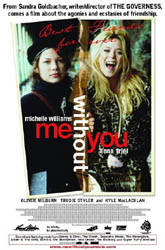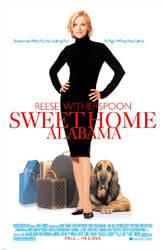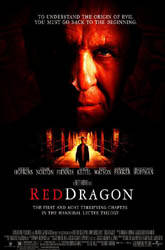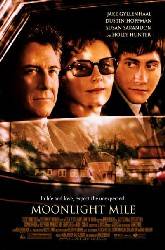 Director: Starring:
OTHER REVIEWS: The Divine Secrets of the Ya-Ya Sisterhood S.L.C. Punk! The Virgin Suicides Y Tu Mamá También |
Me Without You BY: DAVID PERRY There's an odd difference between friendship made by men and made by women. The issues may revolve around similar problems but somehow the hormonal differences create different interaction. While men seem to forge relationships that are genial but shallow, women can find ones that are destructive but deep. Neither is necessary any better than the other: men do not really have a true confidant to turn to when problems arise, women sometimes have to come to terms with the fact that the problem was caused by their confidant. Before this brings reader mail, there are exceptions: not every man is superficial, not every woman is catty. These are generalizations of a complex system of relations that make up the human experience. And, it should most certainly be noted, this view is from the direct observations of a man. I see these occur all the time, but that does not necessarily mean that everyone would see these relationships in the same adjectives as I used (though the ramifications would probably be the same). One person -- a woman, no less -- makes the same observation in her film Me Without You. Sandra Goldbacher, who states that the relationship in the film is based explicitly on one she had, does not accuse the two friends of her film as being destructive for the sake of being destructive. These are complex individuals who want more than anything to meet their own expectations. Unfortunately, their best friend happens to be a constant source of jealous reminders. At its slightest level, Marina (Friel) wishes she had the intellect to succeed in life and Holly (Williams) wishes she had the beauty to succeed in love. Each one has the attribute that the other wants and yet both attempt (most certainly unintentionally) to lower the other so that they can meet their expectations. Holly, the smarter of the two, came from an intelligent, well-structured Jewish family with a loving father (Corduner) and a doting mother (Denicourt). She's always lived next door to Marina in their suburban English neighborhood. Marina, the prettier of the two, came from a broken, pop culture driven home with a pill-popping mother (Styler), rebellious brother (Milburn), and mostly absentee father (Henson). There are two central lovers that serve as the catalysts for Holly and Marina's breaks. First is Marina's brother Nat, who is beloved by his sister almost as much as Holly hero worships him. One night, the two girls decide to crash one of Nat's parties under the belief that The Clash will be there. Instead, all they find is a bunch of people smoking marijuana and injecting heroine. Deciding that this will be a night of experimentation, Marina tries the heroine and Holly loses her virginity to Nat. The film continues into their time as college coeds, both trying to make their mark on the university intelligentsia. Marina does not have a chance, but nevertheless makes it her obligation to break into Holly's inner-circle even if it means stepping on Holly to get there. The main reward for intellect is American professor Daniel (MacLachlan), who impishly tries to make sense of the two women who are trying desperately to get him as a lover. The main difference is that Holly uses their love of Tarkovsky films as an excuse; Marina uses their love of sex. The film spans nearly thirty years in this friendship's development, looking at every up and every down (since the only real ups come at the free-spirited opening scenes, there's a great amount of down to impart). It is best when it looks at the way this codependent relationship treats the supporting players including the affable Nat and the perplexed Daniel. This is a movie that thankfully shows that there's no single level of fault in an altercation -- instead all of these people are equally responsible for what happens, whether it's Holly sleeping with Nat or Daniel cheating with Marina. Sandra Goldbacher is an incredibly able writer, finding
the perfect intensity to each character without making them seem like clichés. By the
end, the audience gets the impression that she is crying to the drums of her own movie.
She's seeing how horrible this little friendship is and cannot help but tear up because
she as the director (and as the onetime friend) can do nothing to fix it. |






